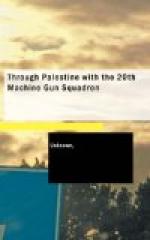At 12.00 we continued the advance along the shores of the lake through pleasant, cultivated country, to the north-west corner; then northward, for about six miles, and down an avenue of trees, past the pretty little Jewish village of Jataine.
The Australians, in front, were held up at Kusa Atra on the Jordan by artillery and machine-guns at the bridge, which the enemy had destroyed. That night the 14th Brigade encamped within two miles of this bridge, having marched over 30 miles that day. Early the next morning (September 28th) the Australians crossed the river by the ford, and “scuppered” the party which had been holding them up, but, unfortunately, with the loss of a few of their number. The 14th Brigade accordingly moved down to the river at 09.00 and watered, and at 15.00 crossed by the bridge which had, by then, been repaired by the Royal Engineers ("No. 2” Section with advance guard fording), and continued north-easterly along what would have been a good road with the help of a steam roller (but at present was the reverse, owing to the large stones put down not being rolled in), to Kuneitra (14 miles by the map but actually hardly less than 20), arriving 23.00.
FOOTNOTES:
[29] Damascus is a very ancient city, and existed even in the time of Abraham. The story that it was here that Cain killed Abel is alluded to by Shakespeare (I King Henry VI, I, 3). While other cities of the East, which were at one time of equal importance, now mostly exist as mounds in the desert, Damascus is still what it was—the capital of Syria.
The following are some of the numerous Biblical references to Damascus: Gen. xiv, 15; II Sam. viii, 5 ("David slew of the Syrians two and twenty thousand men"); II Kings vi, vii, viii, xiii, xiv, xv, xvi; I Chron. xviii, 5 (accounts of battles between the Kings of Judah and Israel and the Kings of Damascus); Isa. xvii; Amos i, 3; Jer. xlix, 23 (prophetical).
St. Paul was converted on
his way to Damascus (Acts ix) in which
connection see also II Cor.
xi, 32 and Acts ix.
In A.D. 1860 a frightful massacre of Christians took place here. By nightfall on July 9th of that year the whole of the Christian Quarter was in flames, the water supply cut off and the inhabitants hemmed in by a circle of steel. As night advanced fresh marauders entered the city and joined the furious mob of fanatics, who now, tired of plunder, began to cry out for blood. All through that awful night and the whole of the following day, the pitiless massacre went on. It is probable that not a Christian would have remained alive but for the untiring energy of Abd-el-Kader (himself a Mohammedan of great renown, but a just man) with his faithful Algerines, who, in 1847, mustering only 2,500 men had completely defeated the army of the Emperor of Morocco 60,000 strong.




